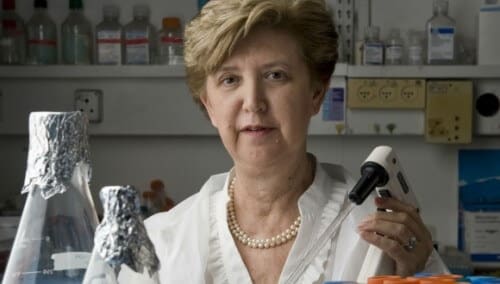The researchers from Tel Aviv University discovered that treatment from the moment of birth using NAP - a segment of the ADNP gene that has a central role in the development of cognition - 'normalized' the development of model mice for ADNP syndrome - a genetic mutation that causes autism and developmental delay in children. The researchers believe that the discovery will pave the way for a new drug. The study was published in the Journal of Clinical Investigation

Researchers from Tel Aviv University, led by Prof. Ilana Gozes from the School of Medicine at Tel Aviv University, discovered that early treatment with the short protein (peptide) NAP 'normalizes' the development of mice in a model for ADNP syndrome - a genetic mutation that is one of the main causes of developmental delay and autism in children. The researchers hope that their work will serve as a basis for developing treatment for children with ADNP syndrome (about 0.17% of all autistic children).
The research was carried out by a research group in the laboratory of Prof. Gozes, head of the Gildor Chair and director of the Alton Laboratory in the Sackler Faculty of Medicine and the Segol School of Neuroscience, with the participation of doctoral students Gal HaCohen-Kleiman, Shlomo Sergovich, Gideon Carmon and Iris Grieg, and in collaboration with researchers from McGill University in Canada and the BIOCEV Center for Biotechnology in the Czech Republic. The article was recently published in the Journal of Clinical Investigation, one of the most prestigious journals in the world for research leading from the laboratory to the clinic.
Springboard for preventive treatment in humans
"About 20 years ago, we discovered in my laboratory a gene called ADNP, in the absence of which the brain is not formed, and the fetus dies at an early stage," says Prof. Gouzes. "Later on, we found that the same gene has a role in the development of cognition, and that embryos with a partial deficiency in ADNP will survive, but will suffer during their lives from mental retardation, and often from autism as well. We also located and extracted from the protein encoded by the gene an active segment called NAP. In recent years, with the development of genetic sequencing technology, random mutations in the ADNP gene, which probably occur during pregnancy, have been discovered in some autistic and/or mentally retarded children: the protein formed is shorter than normal, And as a result, the children suffer from a partial deficiency in ADNP. This phenomenon is called the ADNP syndrome, and we wanted to check if it can be corrected."
For the purpose of the study, the researchers developed a new strain of mice: pairing mice with ADNP syndrome with mice that have a fluorescent substance that glows in their brains. "The luminous substance marks the points in the brain where the synapses are formed - the connection points between the nerve cells," explains Prof. Guzes. "Thanks to the pairing between the two types of mice, we could see and accurately count the amount of synapses formed in the brain. We found that in a mouse with ADNP syndrome, only half the number of synapses were formed compared to a healthy mouse - mainly in the cortex and hippocampus areas of the brain, which are responsible for most cognitive activity. Those mice showed traits of developmental delay, social difficulty and hypersensitivity, similar to children with mental retardation and autism.
In the next step, the researchers treated the affected mice: a daily injection of the NAP peptide from the moment they were born, and continued treatment as a nasal spray to mice weaned on breast milk. The results were most impressive. The treated mice, in contrast to the untreated ones, developed in an improved and even normal manner according to a variety of indicators: they made sounds to call their mothers, showed normal walking ability and memory capacity, knew how to distinguish between a familiar and an unfamiliar mouse, and developed strength in their muscles - similar to healthy mice. Examining the brains of the NAP-treated mice revealed that it had begun to produce a normal number of synapses.
As of today, NAP (also known as 201CP) is under development at Coronis Neurosciences, under a licensing contract from "Ramot" near Tel Aviv University, and Professor Gozes serves as the company's chief scientist. Coronis recently received approval from the US Food and Drug Administration - FDA for orphan drug status for 201CP for the treatment of children with ADNP syndrome. At the beginning of September, the company's representatives met with the representatives of the FDA and outlined a clear way forward for the submission of the final plan for the development of a new drug.
"We hope and believe that our research will be a springboard for the development of supportive preventive treatment in humans," concludes Prof. Gozes. "Prevention - even if only partially - of the symptoms of autism and developmental delay resulting from ADNP syndrome will prevent a lot of suffering from thousands of parents and children all over the world."

One response
This is not a response, this is a question. Will it also be for the treatment of children with autism? Thanks.